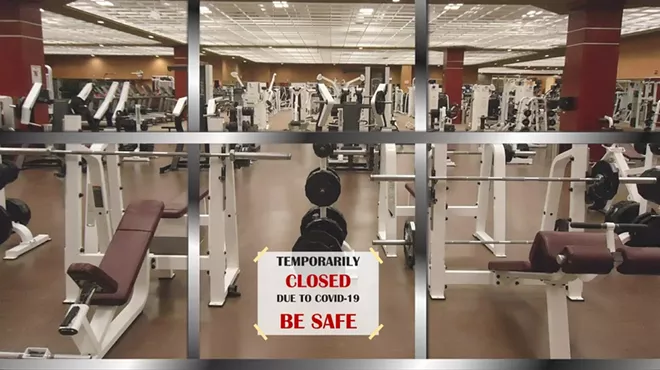Thursday, April 9, 2020
Out of Work? Feeling Sick? Need To Take Care of Your Kids? Here's How To Get Help
As the COVID-19 outbreak forces the economy to a grinding halt, more and more people across the country are losing their jobs.
The U.S. Department of Labor is reporting record-highs in new unemployment insurance claims, with 6.6 million claims filed in the week ending March 28. This marks the highest level of seasonally adjusted initial claims in history.
The Arizona Department of Economic Security reported 88,592 initial claims from Arizona residents in the same week—a staggering jump of nearly 60,000 claims avove the previous week.
Both state and federal governments have put measures in place to increase access to unemployment benefits and other financial assistance programs that can keep people afloat during this uncertain time. Here are the main resources to pursue if you’ve lost income as a result of COVID-19.
Expanded Unemployment Benefits
The federal government passed the CARES (Coronavirus Aid, Relief and Economic Security) Act on Friday, March 27. The new legislation will expand eligibility for unemployment benefits to those who have historically been denied, such contract workers, gig workers and people who are self-employed.
It will also provide beneficiaries with an additional $600 per week in Pandemic Unemployment Compensation on top of the unemployment money already offered by the state of Arizona, which varies between $187 and $240 per week. This money will not be considered “income” for those who use Medicaid or CHIP.
The benefits can be extended for an additional 13 weeks for those who have exhausted their unemployment benefits.
Arizona is currently accepting applications for CARES Act benefits, but those claims won’t be processed until the federal government distributes the money. DES said they will inform the public with the newest information through their website and social media accounts.
On March 20, Arizona Gov. Doug Ducey issued an executive order aiming to open up unemployment benefits in the state. The order waived the usual one-week waiting period after an employee loses a job before they can apply for unemployment benefits and temporarily suspended the requirement that applicants must be actively searching for work.
The order also expanded who is eligible to receive unemployment benefits to include workers whose employers had to temporarily or permanently close, workers who had to miss work to self-quarantine and did not have any available paid leave, workers who had to leave their jobs due to a risk of exposure to COVID-19 and are at particularly high risk for serious infection, workers who had to leave their jobs to care for a family member who has been infected with COVID-19, and any other scenario that would cause a worker to stay home due to the virus.
According to Deputy Press Secretary Brett Bezio, DES has increased their staff from 13 to more than 150 in the call centers, with additional staff joining this week, in order to effectively process unemployment claims.
Because the DES customer service centers are receiving an unprecedented amount of phone calls right now, Bezio recommends callers to continue trying to connect even if they receive a busy signal. The number is 1 (877) 600-2722.
They can also visit www.azui.com to apply for unemployment benefits, view frequently asked questions pertaining to employment impacted by COVID-19 and other important information. Resources for other assistance programs can be found here.
Economic Impact Payments
As part of the CARES Act, the federal government will soon begin distributing $1,200 checks to every taxpayer in an effort to help the nation weather the financial effects of COVID-19.
According to the IRS, tax filers with adjusted gross income up to $75,000 for individuals and up to $150,000 for married couples filing jointly will receive the full payment.
Filers with income above those amounts will have their stimulus payment reduced by $5 for each $100 above the $75,000 and $150,000 thresholds. Single filers exceeding $99,000 and joint filers exceeding $198,000 with no children are not eligible for the payment.
Eligible taxpayers who filed tax returns for either 2019 or 2018 will automatically receive an economic impact payment of up to $1,200 for individuals or $2,400 for married couples and up to $500 for each qualifying child.
Most people will not have to do anything in order to receive this payment; it will be distributed automatically. Taxpayers who typically do not file returns will have to submit a simple tax return form in order to receive their payment.
Social Security recipients and railroad retirees who are otherwise not required to file a tax return are also eligible and will not be required to file a return.
The IRS has warned people to be on the lookout for scammers seeking to swindle economic impact payments.
For more information about economic impact payments, go to www.irs.gov/coronavirus-tax-relief-and-economic-impact-payments.
Paid Family and Medical Leave
The Families First Coronavirus Response Act requires certain employers to provide employees with paid sick leave or expanded family and medical leave for specific reasons related to the COVID-19 outbreak. These rules will apply through Dec. 31, 2020.
The law applies to certain public employers and private employers with fewer than 500 employees. According to the Department of Labor, most federal employees are covered by Title II of the Family and Medical Leave Act.
Employees can qualify for paid leave if:
• They are subject to a federal, state, or local quarantine or isolation order related to COVID-19
• They have been advised by a healthcare provider to self-quarantine because of COVID-19
• They are experiencing COVID-19 symptoms and are seeking a medical diagnosis
• They are caring for someone who has been infected with COVID-19
• They are caring for a child whose school or place of care is closed, or childcare is unavailable, for reasons related to COVID-19
• They are experiencing any other substantially similar condition specified by the Secretary of Health and Human Services
Small businesses with fewer than 50 employees may qualify for exemption from the requirement to provide paid leave due to school closings or childcare unavailability, if the requirement would jeopardize the viability of their business.
The amount of time off varies from two to 12 weeks, and employees will be paid between minimum wage and partial or full pay, depending on the reason. For more information, visit www.dol.gov/agencies/whd/pandemic/ffcra-employee-paid-leave.
Mortgage Assistance
The Federal Housing Finance Agency, which oversees Fannie Mae and Freddie Mac, is encouraging homeowners who are having difficulty paying their mortgages due to COVID-19 to reach out to their mortgage servicers as soon as possible.
Some may be allowed to delay their monthly mortgage payments for a temporary period without incurring late fees, and foreclosures and other legal proceedings will be suspended.
For more information, visit www.fhfa.gov/coronavirus.
Fannie Mae and Freddie Mac each have their own dedicated web pages for homeowners to determine which branch their mortgage is owned by. For Fannie Mae, visit www.knowyouroptions.com/loanlookup or call 1-800-2FANNIE. For Freddie Mac, visit ww3.freddiemac.com/loanlookup/ or call 1-800-FREDDIE.
Immediate Job Openings
The State of Arizona’s main tool for quickly connecting unemployed people to jobs is through Arizona@Work. Individuals can create and post resumes on the site, search for jobs or career training and employers can recruit employees and offer apprenticeships.
On their website, arizonaatwork.com, there is a page with all immediate job openings available in your area.
Similarity, Pima County has established a central web page for residents to find immediate employment. Their page has a long list of local employers who are currently recruiting for positions, and it has a subscription service that individuals can use to get daily updates about job openings. Click here for more info.
You can call the Pima County Dislocated Workers Hotline at (520) 724-5735 to receive help with job leads, receive referrals to community resources and access the Arizona Unemployment Insurance website.
Other Community Resources
The Arizona Department of Economic Security has a long list of helpful community resources for specific needs from food insecurity to finding employment, education to housing, health services to veterans services, and more. Visit here to connect with external programs that may be able to provide assistance at this time.
The U.S. Department of Labor is reporting record-highs in new unemployment insurance claims, with 6.6 million claims filed in the week ending March 28. This marks the highest level of seasonally adjusted initial claims in history.
The Arizona Department of Economic Security reported 88,592 initial claims from Arizona residents in the same week—a staggering jump of nearly 60,000 claims avove the previous week.
Both state and federal governments have put measures in place to increase access to unemployment benefits and other financial assistance programs that can keep people afloat during this uncertain time. Here are the main resources to pursue if you’ve lost income as a result of COVID-19.
Expanded Unemployment Benefits
The federal government passed the CARES (Coronavirus Aid, Relief and Economic Security) Act on Friday, March 27. The new legislation will expand eligibility for unemployment benefits to those who have historically been denied, such contract workers, gig workers and people who are self-employed.
It will also provide beneficiaries with an additional $600 per week in Pandemic Unemployment Compensation on top of the unemployment money already offered by the state of Arizona, which varies between $187 and $240 per week. This money will not be considered “income” for those who use Medicaid or CHIP.
The benefits can be extended for an additional 13 weeks for those who have exhausted their unemployment benefits.
Arizona is currently accepting applications for CARES Act benefits, but those claims won’t be processed until the federal government distributes the money. DES said they will inform the public with the newest information through their website and social media accounts.
On March 20, Arizona Gov. Doug Ducey issued an executive order aiming to open up unemployment benefits in the state. The order waived the usual one-week waiting period after an employee loses a job before they can apply for unemployment benefits and temporarily suspended the requirement that applicants must be actively searching for work.
The order also expanded who is eligible to receive unemployment benefits to include workers whose employers had to temporarily or permanently close, workers who had to miss work to self-quarantine and did not have any available paid leave, workers who had to leave their jobs due to a risk of exposure to COVID-19 and are at particularly high risk for serious infection, workers who had to leave their jobs to care for a family member who has been infected with COVID-19, and any other scenario that would cause a worker to stay home due to the virus.
According to Deputy Press Secretary Brett Bezio, DES has increased their staff from 13 to more than 150 in the call centers, with additional staff joining this week, in order to effectively process unemployment claims.
Because the DES customer service centers are receiving an unprecedented amount of phone calls right now, Bezio recommends callers to continue trying to connect even if they receive a busy signal. The number is 1 (877) 600-2722.
They can also visit www.azui.com to apply for unemployment benefits, view frequently asked questions pertaining to employment impacted by COVID-19 and other important information. Resources for other assistance programs can be found here.
Economic Impact Payments
As part of the CARES Act, the federal government will soon begin distributing $1,200 checks to every taxpayer in an effort to help the nation weather the financial effects of COVID-19.
According to the IRS, tax filers with adjusted gross income up to $75,000 for individuals and up to $150,000 for married couples filing jointly will receive the full payment.
Filers with income above those amounts will have their stimulus payment reduced by $5 for each $100 above the $75,000 and $150,000 thresholds. Single filers exceeding $99,000 and joint filers exceeding $198,000 with no children are not eligible for the payment.
Eligible taxpayers who filed tax returns for either 2019 or 2018 will automatically receive an economic impact payment of up to $1,200 for individuals or $2,400 for married couples and up to $500 for each qualifying child.
Most people will not have to do anything in order to receive this payment; it will be distributed automatically. Taxpayers who typically do not file returns will have to submit a simple tax return form in order to receive their payment.
Social Security recipients and railroad retirees who are otherwise not required to file a tax return are also eligible and will not be required to file a return.
The IRS has warned people to be on the lookout for scammers seeking to swindle economic impact payments.
For more information about economic impact payments, go to www.irs.gov/coronavirus-tax-relief-and-economic-impact-payments.
Paid Family and Medical Leave
The Families First Coronavirus Response Act requires certain employers to provide employees with paid sick leave or expanded family and medical leave for specific reasons related to the COVID-19 outbreak. These rules will apply through Dec. 31, 2020.
The law applies to certain public employers and private employers with fewer than 500 employees. According to the Department of Labor, most federal employees are covered by Title II of the Family and Medical Leave Act.
Employees can qualify for paid leave if:
• They are subject to a federal, state, or local quarantine or isolation order related to COVID-19
• They have been advised by a healthcare provider to self-quarantine because of COVID-19
• They are experiencing COVID-19 symptoms and are seeking a medical diagnosis
• They are caring for someone who has been infected with COVID-19
• They are caring for a child whose school or place of care is closed, or childcare is unavailable, for reasons related to COVID-19
• They are experiencing any other substantially similar condition specified by the Secretary of Health and Human Services
Small businesses with fewer than 50 employees may qualify for exemption from the requirement to provide paid leave due to school closings or childcare unavailability, if the requirement would jeopardize the viability of their business.
The amount of time off varies from two to 12 weeks, and employees will be paid between minimum wage and partial or full pay, depending on the reason. For more information, visit www.dol.gov/agencies/whd/pandemic/ffcra-employee-paid-leave.
Mortgage Assistance
The Federal Housing Finance Agency, which oversees Fannie Mae and Freddie Mac, is encouraging homeowners who are having difficulty paying their mortgages due to COVID-19 to reach out to their mortgage servicers as soon as possible.
Some may be allowed to delay their monthly mortgage payments for a temporary period without incurring late fees, and foreclosures and other legal proceedings will be suspended.
For more information, visit www.fhfa.gov/coronavirus.
Fannie Mae and Freddie Mac each have their own dedicated web pages for homeowners to determine which branch their mortgage is owned by. For Fannie Mae, visit www.knowyouroptions.com/loanlookup or call 1-800-2FANNIE. For Freddie Mac, visit ww3.freddiemac.com/loanlookup/ or call 1-800-FREDDIE.
Immediate Job Openings
The State of Arizona’s main tool for quickly connecting unemployed people to jobs is through Arizona@Work. Individuals can create and post resumes on the site, search for jobs or career training and employers can recruit employees and offer apprenticeships.
On their website, arizonaatwork.com, there is a page with all immediate job openings available in your area.
Similarity, Pima County has established a central web page for residents to find immediate employment. Their page has a long list of local employers who are currently recruiting for positions, and it has a subscription service that individuals can use to get daily updates about job openings. Click here for more info.
You can call the Pima County Dislocated Workers Hotline at (520) 724-5735 to receive help with job leads, receive referrals to community resources and access the Arizona Unemployment Insurance website.
Other Community Resources
The Arizona Department of Economic Security has a long list of helpful community resources for specific needs from food insecurity to finding employment, education to housing, health services to veterans services, and more. Visit here to connect with external programs that may be able to provide assistance at this time.












